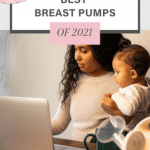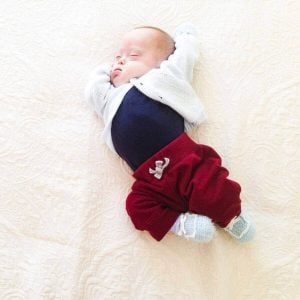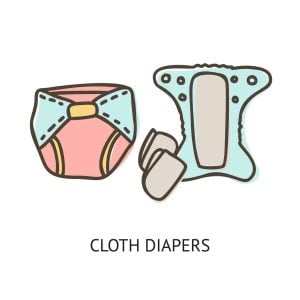After I found out I was pregnant with my first daughter, one of the first significant parenting decisions I made was to breastfeed, which quickly lead me to wonder about the best breast pumps out there.
Once I had in my head that I wanted to nurse my baby, I set out to learn everything I could about the process.
I did a deep dive into the baby registry must-haves for any nursing mom. Then, I learned all about the most comfortable breastfeeding positions and how to increase my breastmilk supply. After that, I even hit up my local Target and found some adorable nursing pajamas that would end up becoming one of my hospital bag essentials.
With hours of research and hundreds of dollars spent on nursing and maternity bras, a nursing pillow, and the pièce de résistance – nipple cream, I felt ready to start my breastfeeding journey.
It wasn’t until my sister-in-law, who was also pregnant at the time, asked me what breast pump types I was considering that I realized I’d forgotten a vital piece of the puzzle…
…I would also have to pump milk for my soon-to-be daughter!
Thus began a new study in all things breast-pump related.
Choosing a breast pump is not always the most straightforward task. It’s crucial to consider how you’ll be using it, where you’ll be using it, and how it can benefit your nursing experience.
While there are tons of different options to choose from, we’ve polled our brilliant community of moms and narrowed down the best breast pumps so you don’t have to!

This site contains affiliate links, meaning that we earn a small commission for purchases made through our site. We only recommend products we personally use, love, or have thoroughly vetted.
Do I Need to Buy a Breast Pump?
So, you might be thinking – “Yes, but do I really need to buy a breast pump?”
The short answer is probably.
Unless you plan on never leaving your baby for more than a few hours or supplementing with formula when other people are watching your little one, you’ll have to have some way of expressing milk for them.
Thankfully, though, there are tons of breast pumps styles available to fit your family’s budget, size, and usage requirements.
When Should You Start Choosing a Breast Pump?
While there’s certainly no wrong time for choosing and ordering a breast pump, many women start looking into them during their third trimester.
One important thing to keep in mind is whether you’ll use your insurance company to get a pump.
By law, every health insurance company has to provide its customers with breast pumps. Depending on your policy, this can mean they’ll rent one to you or buy one for you outright.
If you want to make sure you have your pump readily available when your baby arrives, you should start the insurance process around 30 weeks.
Some women would prefer waiting to make a decision, and that’s fine. In cases like these, you’ll be eligible for insurance coverage for up to one year postpartum.
Is it Okay to Use a Second-Hand Breast Pump?
When it comes to finding the best breast pumps, you’ll find that the FDA considers most devices to be single-user. When renting a pump from a hospital or other reliable company, however, the pumps will be thoroughly sterilized to allow for multiple users.
Should You Buy an Electric Breast Pump?
Once you’re ready to start choosing a breast pump and are scanning our list of the best breast pumps available, you’ll probably notice that many of the top options are electric.
This often begs the question–is buying an electric breast pump the best choice for you and your baby?
While electric pumps offer great benefits, such as more natural-feeling suction, the opportunity to pump both breasts at once, and increased power, they’re certainly not the only option available.
Some people even believe electric pumps are problematic.
If you’re one of the 8-out-of-10 moms planning on breastfeeding, it’s essential to understand the problems that can come from choosing an electric pump.
Disadvantages of an Electric Breast Pump
Of the 85% of breastfeeding mothers who have expressed milk at some point or another, the majority use some type of electric pump.
While there are plenty of great reasons for this, there are also certain disadvantages of an electric breast pump. These include:
- Nursing moms can’t use electric pumps in emergency circumstances, such as losing power or having access to batteries.
- If women don’t use correctly sized flanges while pumping, it can lead to nipple damage. (Note: If you’re not sure which flange size is right for your body, it’s a good idea to make an appointment with a certified lactation consultant).
- Pumps that aren’t thoroughly cleaned and sanitized can cause breast milk to become contaminated.
- Electric pumps can cause breast milk oversupply and breast engorgement.
While it’s worth noting that manual and wireless breast pumps can cause these problems, they’re more common with electric systems.

Breaking it All Down: What are the Best Breast Pumps for Nursing Mothers?
Now for the moment you’ve all been waiting for–it’s time to discuss the best breast pumps on the market! Whether you’re looking for the best electric breast pump, the best breast pump for low milk supply, or the best breast pump for pumping at work, we’re here to help.
Best Electric Breast Pumps & Battery-Powered Breast Pumps
So, you’ve gone over the disadvantages of an electric breast pump but still feel like it’s the best option for you, we hear you! Electric breast pumps can be a great option if they are used correctly.
If you want to use one of the best electric breast pumps or battery-powered pumps on the market, check out these options:
1. Spectra Baby USA S1 Plus Electric
Among our team, the Spectra Baby USA S1 Plus Electric pump is one of the most popular choices for any mother that’s ready to start their nursing journey.
Not only is this pump highly portable, but it also includes adjustable suction settings for a flexible and versatile pumping experience. This is also considered one of the best electric breast pump products by many lactation educators.
In addition, it comes with a rechargeable battery pack that’s ideal for emergencies when you don’t have access to power.
2. Medela Pump in Style Advanced
While this breast pump is slightly controversial for reasons we’ll mention in a moment, the Medela Pump in Style Advanced is also one of the most popular breast pump styles on the market. In fact, this is one of the most common options if you go through your insurance company to purchase or rent your pump.
I personally used the Medela Pump in Style Advanced while pumping for my daughters and had a great experience with it.
Other moms, like our fearless leader Katy, dealt with milk supply issues after using this pump, and we hear from lactation consultants that this is a common problem with this pump.
If you’re wondering whether the Medela is the right option for you and your family, consider talking to a certified lactation specialist before choosing a breast pump.
3. Ikare Double Electric Breast Pump
Made from high-quality BPA-free materials, the Ikare Double Electric Breast Pump is one of the most affordable and best breast pumps on Amazon.
Noted for being a hospital-grade breast pump, this device offers strong suction, memory controls, and a quiet operational system. Plus, it’s an excellent option for mommies on a budget.
While most users rave about the Ikare’s usability, some reviewers mentioned they didn’t get as strong of suction when double pumping.
Best Manual Breast Pumps
Whether you’re nursing or exclusively pumping, there are bound to be times when you’re away from your little one, and your breasts start to feel a little, *ahem* – full.
That’s where manual breast pumps come in.
While not as efficient as electric and battery-powered breast pumps, these devices offer great assistance when you’re out and about. They’re relatively small, making them easy to throw into your diaper bag or diaper bag backpack for a quick pumping session on the go.
These aren’t the only benefits of manual breast pumps, however. Many moms use them to “catch milk” while their baby is nursing.
When you’re nursing your babe on one breast, there’s no stopping the let-down and release of milk that’s bound to still happen on the other one. Take a moment to think about all of that incredible milk streaming out of your nipple and getting soaked up by your shirt or nipple pad.
Say it with me: what a waste!
Thankfully, a brilliant friend of mine offered me a solution to this problem – she gave me a Haakaa for my baby shower!

1. The Haakaa
The Haaka is a godsend for when you need to manually pump quickly and easily–whether when you’re nursing your baby on one side, or you just can’t quite get your electric pump to work (or you’re on-the go)!
A Haakaa is a simple, silicone manual breast pump that women can hold up to the opposite breast while nursing to catch all of that precious milk you would have otherwise lost. This is a great way to start a small stockpile of milk before you’re ready to start pumping.
Whether you’re interested in a Haakaa or some other type of manual breast pump, these are a few of our favorite options:
- Haakaa Manual Breast Pump
- Medela Harmony Manual Breast Pump
- Bumblebee Manual Breast Pump (Similar to the Haakaa, but with a few different features.)
- Lansinoh Manual Breast Pump
2 & 3. Best Breast Pumps for Low Milk Supply: The Spectra S1 or Medela Symphony
Did you know that 21.6% of women who discontinued nursing before they were planning to did so because of problems with their milk supply?
There are plenty of ways to increase your milk supply that doesn’t involve a breast pump. These include:
- Taking galactagogue supplements, i.e., fenugreek or Blessed Thistle
- Drinking more water
- Add in pumping sessions between feeds
- Get plenty of rest
If you’re interested in the best breast pumps for low milk supply, there are a few good options you might want to consider.
For starters, most hospital-grade pumps are better for milk supply issues.
In terms of specific devices, however, the Spectra S1 is great for milk production. The Medela Symphony is another solid choice, but it’s expensive – you might want to consider renting this one from your hospital.
4 & 5. Best Breast Pump for Working Moms: Elvie Hands-Free or Willow Wearable
While any of the electric or battery-powered pumps on our list are reliable options for nursing mothers returning to work, wireless devices are among the best breast pumps for pumping at work.
Wireless breast pumps, such as the Elvie Hands-Free System or the Willow Wearable pump, offer a hands-free pumping experience.
It’s essential to keep in mind that, while they’re meant to be a more convenient pumping solution, it doesn’t mean they’re entirely discreet. While many systems claim to be quiet, they often make low pumping noises.
Most wireless breast pump companies will also try to make you believe that no one will notice the large breast pumps inserted in your bra.
On the contrary, they’re actually quite noticeable. You might want to consider some type of cover or scarf while pumping if the noticeability bothers you.
Make sure you also have the correct flange size for extra comfort and to avoid spillage.
Best Breast Pump for Moms that Exclusively Pumping
No two breastfeeding journeys are the same. For some new moms, nursing their little ones either doesn’t work or isn’t something they’re interested in.
This doesn’t mean, however, that they don’t want their baby to receive the benefits of breast milk. In this case, exclusively pumping can be an optimal alternative.
If you’re solely expressing milk for your baby, though, it’s crucial to have one of the best breast pumps for the job. Aside from choosing a hospital-grade pump, many moms like to use a combination of an electric breast pump and a wearable pump.
Starting Your Pumping Journey on the Right…Boob
So, while there’s no hard and fast rule about needing to buy a breast pump, it can certainly help simplify your breastfeeding experience. And while choosing a breast pump might seem like a major undertaking, it doesn’t have to be.
If you want to make sure you’re getting the best electric breast pump, wireless pump, or manual pump, any of the options on this list are sure to provide the 5-star experience you deserve.
Have you used any of the best breast pumps on this list? What’s your favorite?

















